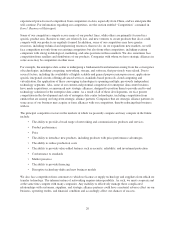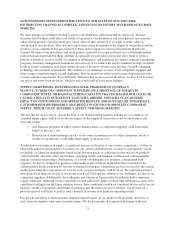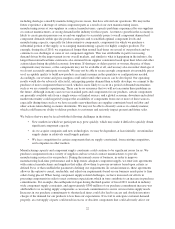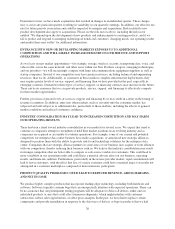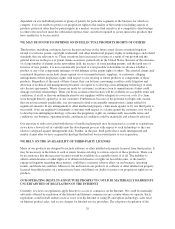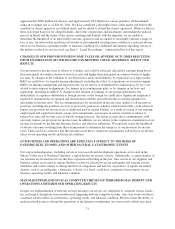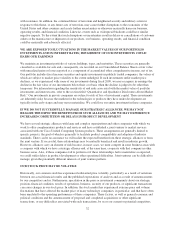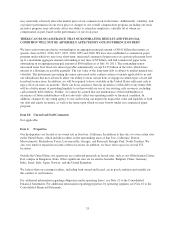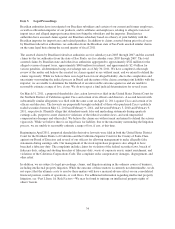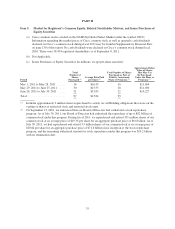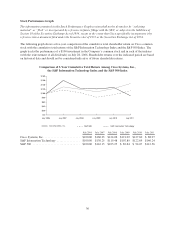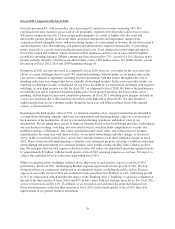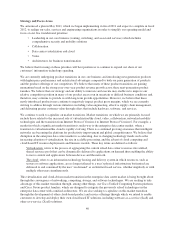Cisco 2011 Annual Report Download - page 38
Download and view the complete annual report
Please find page 38 of the 2011 Cisco annual report below. You can navigate through the pages in the report by either clicking on the pages listed below, or by using the keyword search tool below to find specific information within the annual report.Internet and Internet commerce could decrease demand for our products and, at the same time, increase the cost
of selling our products, which could have a material adverse effect on our business, operating results, and
financial condition.
CHANGES IN TELECOMMUNICATIONS REGULATION AND TARIFFS COULD HARM OUR
PROSPECTS AND FUTURE SALES
Changes in telecommunications requirements, or regulatory requirements in other industries in which we operate,
in the United States or other countries could affect the sales of our products. In particular, we believe that there
may be future changes in U.S. telecommunications regulations that could slow the expansion of the service
providers’ network infrastructures and materially adversely affect our business, operating results, and financial
condition.
Future changes in tariffs by regulatory agencies or application of tariff requirements to currently untariffed
services could affect the sales of our products for certain classes of customers. Additionally, in the United States,
our products must comply with various requirements and regulations of the Federal Communications
Commission and other regulatory authorities. In countries outside of the United States, our products must meet
various requirements of local telecommunications and other industry authorities. Changes in tariffs or failure by
us to obtain timely approval of products could have a material adverse effect on our business, operating results,
and financial condition.
FAILURE TO RETAIN AND RECRUIT KEY PERSONNEL WOULD HARM OUR ABILITY TO
MEET KEY OBJECTIVES
Our success has always depended in large part on our ability to attract and retain highly skilled technical,
managerial, sales, and marketing personnel. Competition for these personnel is intense, especially in the Silicon
Valley area of Northern California. Stock incentive plans are designed to reward employees for their long-term
contributions and provide incentives for them to remain with us. Volatility or lack of positive performance in our
stock price or equity incentive awards, or changes to our overall compensation program, including our stock
incentive program, resulting from the management of share dilution and share-based compensation expense or
otherwise, may also adversely affect our ability to retain key employees. As a result of one or more of these
factors, we may increase our hiring in geographic areas outside the United States, which could subject us to
additional geopolitical and exchange rate risk. The loss of services of any of our key personnel; the inability to
retain and attract qualified personnel in the future; or delays in hiring required personnel, particularly engineering
and sales personnel, could make it difficult to meet key objectives, such as timely and effective product
introductions. In addition, companies in our industry whose employees accept positions with competitors
frequently claim that competitors have engaged in improper hiring practices. We have received these claims in
the past and may receive additional claims to this effect in the future.
ADVERSE RESOLUTION OF LITIGATION OR GOVERNMENTAL INVESTIGATIONS MAY HARM
OUR OPERATING RESULTS OR FINANCIAL CONDITION
We are a party to lawsuits in the normal course of our business. Litigation can be expensive, lengthy, and
disruptive to normal business operations. Moreover, the results of complex legal proceedings are difficult to
predict. For example, Brazilian authorities have investigated our Brazilian subsidiary and certain of our current
and former employees, as well as a Brazilian importer of our products, and its affiliates and employees, relating
to alleged evasion of import taxes and alleged improper transactions involving the subsidiary and the importer.
Brazilian tax authorities have assessed claims against our Brazilian subsidiary based on a theory of joint liability
with the Brazilian importer for import taxes and related penalties. The asserted claims by Brazilian federal tax
authorities are for calendar years 2003 through 2007 and the related asserted claims by the tax authorities from
the state of Sao Paulo, are for calendar years 2005 through 2007. The total asserted claims by Brazilian state and
federal tax authorities aggregated to approximately $522 million for the alleged evasion of import taxes,
30


